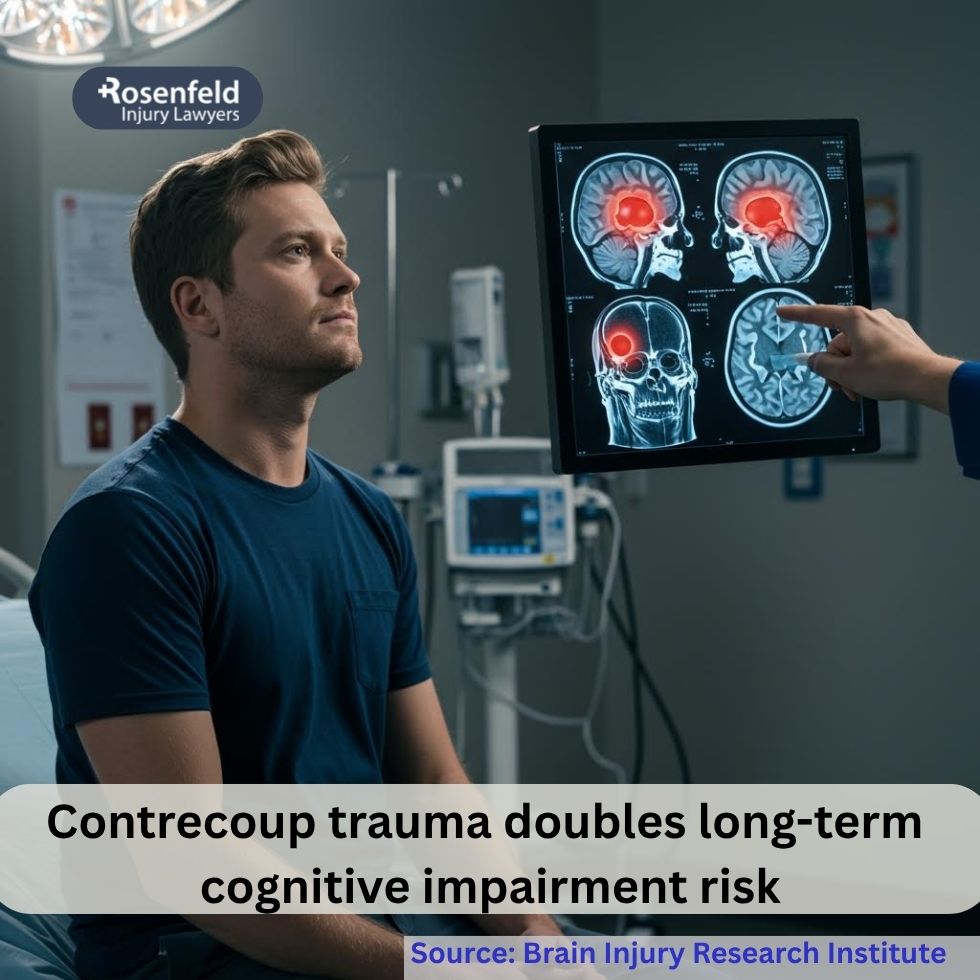- 24/7 Free Consultation: (888) 424-5757 Tap Here To Call Us
What Are Coup and Contrecoup Brain Injuries?

Traumatic brain injuries (TBIs) are among the most serious types of injuries a person can experience. They often cause long-term health problems, emotional struggles, and financial hardship. But, what are coup and countercoup brain injuries?
In simple terms, a coup injury occurs at the site of impact when the head impacts a moving or stationary object. A contrecoup injury takes place on the opposite side of the brain, where it rebounds inside the skull. When both contrecoup and coup injuries occur together, the damage can be devastating.
In Chicago, coup-contrecoup injuries frequently result from car accidents, pedestrian impacts at busy intersections like Michigan Avenue and State Street, and falls at construction sites. The fast-paced, crowded environment of the city increases the risk of these complex brain injuries.
If you’ve suffered a serious head injury in Chicago or anywhere in Illinois, our experienced brain injury attorneys are here to help.

What Are Coup and Contrecoup Brain Injuries?
A coup-contrecoup injury is a type of traumatic brain injury (TBI) where the brain is damaged at both the site of impact (coup) and the far side of the brain (contrecoup). This occurs when the brain strikes the inside of the skull due to sudden, violent movement, common in car crashes, falls, and sports accidents.
- Coup injury: Damage occurs at the initial point where the brain collides with the inside of the skull.
- Contrecoup injury: Damage occurs on the opposite side of the brain as it rebounds forcefully within the skull.
Imagine a bucket of water. If you slam the bucket against a wall, the water first hits one side, then sloshes back forcefully in the opposite direction. The brain behaves much the same way during blunt force trauma, slamming into one side of the skull and then rebounding to cause damage to the other.
This violent movement can shear brain tissue, rupture blood vessels, and disrupt the delicate structures between the brain’s gray and white matter. Areas like the temporal lobe, frontal lobe, and corpus callosum are especially vulnerable when coup contrecoup injuries occur.
Because coup contrecoup brain injury involves two separate areas of trauma, the outcome can be devastating. Victims may experience a severe injury that affects multiple regions of brain function, significantly increasing the risk of long-term cognitive, emotional, and physical impairment.
Most injuries resulting from serious accidents, such as a head hitting a steering wheel or falling against the pavement, involve both a coup and contrecoup component. In these cases, the brain moves violently inside the skull, causing injury to both the site of impact and the opposite side.
Coup vs. Contrecoup vs. Concussion: What’s the Difference?
Understanding the difference between these types of head injury is critical when evaluating the severity of trauma:
- Coup injury: A direct blow causes localized damage where the initial impact occurred.
- Contrecoup injury: Damage occurs on the opposite side of the brain, often after the brain rebounds against the skull’s interior.
- Concussion: A type of traumatic brain injury that may cause temporary disruption of brain function but typically does not involve significant structural damage.
While a concussion can accompany a coup contrecoup injury, coup-contrecoup injuries tend to involve more extensive harm, including:
- Bleeding (such as intracerebral hemorrhage)
- Shearing of fibers at the junction of brain layers
- Disruption of structures like the temporal lobe and frontal lobe
In severe cases, diffuse axonal injury and widespread tearing of brain connections may occur, significantly complicating recovery.
Unlike simple concussions, coup-contrecoup brain injuries often present common symptoms that worsen over time. These symptoms can include persistent headaches, memory loss, speech difficulties, and emotional instability. Immediate diagnosis is essential because when coup-contrecoup injuries occur, early intervention can prevent further severe damage.
It is also vital to understand that after the second injury, the rebound impact, brain swelling, and internal bleeding can develop, placing life-threatening pressure on sensitive areas.
In many coup-contrecoup injury cases, especially those from car accidents or falls, the damage is not isolated to the point where the head is hit but also to the opposite side, where negative pressure and skull impact further injure delicate brain structures. This dual impact explains why victims often face longer recoveries and more complex rehabilitation compared to those who suffer only a concussion.

Symptoms of Coup-Contrecoup Injuries
Symptoms of a coup-contrecoup brain injury can vary widely depending on the severity of the impact and which areas of the brain were affected. When a coup injury damages the impact site, and a contrecoup injury causes harm to areas that occur opposite inside the skull, critical regions like the frontal lobe are often involved.
Since these brain regions control memory, behavior, and motor skills, individuals may experience a range of serious physical, cognitive, and emotional problems. In some cases, symptoms appear immediately after trauma; in others, warning signs may develop slowly over hours or days.
Common symptoms include:
- Persistent headaches
- Nausea and vomiting
- Dizziness or vertigo
- Blurred vision or light sensitivity
- Amnesia or confusion
- Ringing in the ears
- Slurred speech or trouble concentrating
- Seizures (in severe cases)
- Loss of consciousness
- Behavioral changes, irritability, or emotional instability
Extensive damage to the frontal and temporal lobes often results in lasting deficits:
- Cognitive impairments (memory loss, attention deficits)
- Speech and language difficulties
- Chronic pain or balance problems
- Emotional and psychological challenges, including depression, PTSD, and personality changes
- Reduced earning capacity and independence
Some individuals may never regain full function, emphasizing the need for long-term planning and support after a serious cranial trauma.
If you’re experiencing these symptoms after a Chicago accident, seek emergency care and contact our law firm for a free case evaluation.
What Causes Coup-Contrecoup Brain Injuries?
Coup-contrecoup injuries often result from violent forces that cause the brain to collide against the skull’s inner walls. Common causes include:
- Car accidents, especially rear-end collisions and head-on crashes
- Motorcycle or bicycle accidents
- Falls from heights or onto hard surfaces, including construction site falls
- Slip and fall accidents on icy sidewalks or wet store floors
- Sports injuries in football, hockey, or boxing
- Physical assaults or shaken baby syndrome
- Explosions and combat-related trauma
In Chicago, winter conditions, congested streets, and numerous active construction zones contribute to a higher risk of blunt force trauma that leads to coup or contrecoup injuries.

Closed Head Injury and Coup-Contrecoup Trauma
A closed head coup contrecoup injury happens when the brain is injured without an open wound to the skull. Many coup contrecoup injuries are classified as closed head damage, meaning the damage happens inside the skull without any external fracture.
This internal movement and bruising can be even more dangerous because the swelling and bleeding are not immediately visible. In cases where a stationary head is struck during a car accident or a fall onto a hard surface, severe damage can occur without any obvious signs on the scalp or skull. Closed head wounds usually require CT scans or MRIs to diagnose the extent of brain tissue damage.
Coup-Contrecoup and the Mechanics of Brain Movement
The human brain floats in the cerebrospinal fluid within the skull. When subjected to a sudden force, the brain moves rapidly toward the skull wall during the initial impact and rebounds toward the opposite side, a phenomenon known as contrecoup.
Rotational forces, negative pressure changes, and rapid acceleration and deceleration movements further increase damage. Diffuse axonal injury, tearing of the gray-white matter junction, and bleeding within the brain tissue often accompany these events.
When a moving head strikes a fixed object, like a steering wheel or the pavement, the risk of severe brain injury multiplies.
Diagnosis and Medical Treatment
Prompt diagnosis is crucial to improve outcomes:
- CT scans detect skull fractures, hemorrhages, and swelling.
- MRI scans reveal soft tissue brain damage not always visible on CT.
- Neurological exams assess cognitive and motor function.
Treatment options depend on injury severity:
- Rest and observation during the acute phase
- Medication to reduce cerebral edema
- Surgery to relieve pressure or repair skull fractures
- Physical therapy, occupational therapy, and cognitive rehabilitation
Understanding Axonal Injury After Coup-Contrecoup Trauma
In severe coup-contrecoup injuries, doctors often diagnose a type of damage called axonal injury. This occurs when the brain’s nerve fibers (axons) are stretched, torn, or sheared during violent movement inside the skull.
This injury is especially common when rapid acceleration or deceleration forces the brain to shift inside the cerebrospinal fluid. Even without obvious bleeding, axonal damage can cause serious long-term cognitive and physical impairments. Early imaging and neurological testing are crucial for detecting these injuries and initiating appropriate treatment to improve outcomes.
Without early intervention, coup contrecoup injuries can cause permanent disability or death.

Legal Damages Available in Illinois TBI Lawsuits
When a coup contrecoup injury happens, the effects are often devastating, impacting not only the brain but every part of a person’s life. Victims of severe head trauma, such as a coup injury at the impact site combined with a contrecoup injury where the brain rebounds, are entitled to pursue full financial recovery.
Whether the harm resulted from an immobile head hitting a hard surface during a fall, violent movement during a car accident, or a moving object, Illinois law allows victims to claim a variety of damages tied to the long-term consequences of brain trauma.
Below are the main categories of compensation available after a coup contrecoup injury.
Economic Damages
Economic damages cover the direct financial losses caused by a coup contrecoup brain injury. These expenses are often extensive because brain injuries frequently require emergency treatment, surgeries, rehabilitation, and lifelong medical care.
Economic damages may include:
- Medical costs (both current expenses and future anticipated treatments)
- Lost wages from time off work due to the injury
- Diminished earning capacity for victims unable to return to their previous careers
- Home modifications, assistive equipment, and in-home care for those facing permanent disabilities
The financial burden following a serious coup injury or contrecoup injury can be overwhelming, making it essential to account for all projected costs when building a legal case.
Non-Economic Damages
In addition to tangible expenses, victims of coup contrecoup injuries can also recover non-economic damages. These losses represent the profound emotional, psychological, and lifestyle changes caused by severe brain trauma.
Non-economic damages often include:
- Pain and suffering from both the initial trauma and ongoing complications
- Emotional distress, including anxiety, depression, or PTSD, resulting from brain dysfunction
- Loss of enjoyment of life due to cognitive impairment, mobility issues, and reduced independence
Because coup contrecoup injuries often involve damage to critical regions like the frontal lobe, victims may struggle with behavior, personality changes, and cognitive decline, deeply affecting their quality of life.
Wrongful Death Damages (in Fatal Cases)
When a coup contrecoup brain injury results in death, surviving family members may pursue wrongful death damages. These cases recognize both the financial and emotional losses suffered after a loved one’s passing.
Wrongful death damages may include:
- Funeral expenses and burial costs
- Loss of companionship for spouses, children, and close family
- Loss of financial support the deceased would have provided
Illinois law allows families to hold responsible parties accountable when a brain injury proves fatal. When the stationary head impact and subsequent contrecoup injury lead to irreversible swelling or hemorrhage, these lawsuits provide a critical path for families to seek justice.
Illinois Statute of Limitations for Brain Injury Claims
In Illinois, you generally have two years from the date of injury to file a personal injury lawsuit. However, exceptions exist:
- Minors often have longer timeframes to bring a claim.
- The discovery rule can extend deadlines if the brain injury wasn’t immediately known.
- Medical malpractice cases involving brain injuries have specific rules and filing deadlines.
The symptoms of a contrecoup injury may not appear right away, making it especially important to understand how the discovery rule might apply. Waiting too long could risk losing the ability to pursue compensation for the full extent of harm.
Speaking to an experienced brain injury attorney early protects your rights and allows a full investigation before critical evidence is lost.

Sample Illinois Coup-Contrecoup Injury Settlements
Here are examples of real outcomes for brain injury victims:
- $5.4 million for a construction worker who fell from scaffolding, sustaining coup and contrecoup brain injuries.
- $2.8 million settlement after a Chicago pedestrian struck by a moving vehicle suffered extensive contrecoup brain damage.
- $3.2 million for a rear-end car accident victim with a coup contrecoup injury and permanent cognitive deficits.
- $1.9 million was awarded to a cyclist who struck a stationary object due to poor road maintenance, sustaining severe contrecoup injury.
Each case depends on factors such as the extent of neurological damage, recovery prospects, and liability issues.
What To Do If You Suspect a Coup-Contrecoup Injury
After an accident:
- Seek medical attention immediately
- Do not discuss fault with the other party’s insurance company
- Preserve evidence such as medical records, photos, and witness information
- Contact a brain injury attorney promptly to protect your rights
Swift action can help prove how the injury occurred and strengthen your case for compensation.
FAQs
How serious is a coup-contrecoup injury?
These injuries are often life-altering, affecting multiple areas of the brain and its functions. Recovery can take months or years, and many individuals face permanent deficits.
Is a coup-contrecoup injury different from whiplash?
Yes. Whiplash typically involves soft tissue injury to the neck. Coup or contrecoup injuries involve direct trauma to the brain itself, leading to far more severe consequences.
Can a concussion become a coup-contrecoup injury?
A concussion is a form of mild traumatic brain injury. However, a significant force can cause both a concussion and coup-contrecoup brain injuries at once.
How much is my Chicago brain injury case worth?
Case values vary widely depending on the severity of brain damage, the impact on earning ability, the necessary future care, and the emotional effects. Consulting with an experienced coup contrecoup injury attorney helps assess potential damages.
Can I sue if the accident happened on private property?
Yes. If a slip, fall, or impact on private property caused a coup contrecoup brain injury, you may have a premises liability claim. Property owners are required to maintain safe conditions under Illinois law.
Contact Our Chicago Brain Injury Attorneys Today

Our personal injury team handles complex coup-contrecoup brain injury cases by investigating accidents, consulting medical experts, and calculating long-term care and income losses. We negotiate with insurance companies and are ready to take cases to trial if needed. We also work on a contingency fee basis, meaning you pay nothing unless we recover compensation for you.
At our law firm, we have extensive experience helping TBI victims throughout Cook County, DuPage County, Lake County, and across Illinois. We offer compassionate guidance, aggressive advocacy, and a deep understanding of the unique challenges brain injury survivors face.
We offer a free consultation to discuss your case and legal options.
Call (888) 424-5757 or fill out our form to get started.
All content undergoes thorough legal review by experienced attorneys, including Jonathan Rosenfeld. With 25 years of experience in personal injury law and over 100 years of combined legal expertise within our team, we ensure that every article is legally accurate, compliant, and reflects current legal standards.







